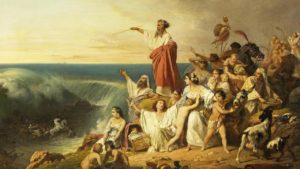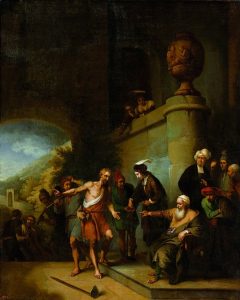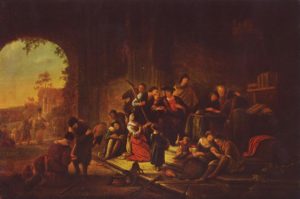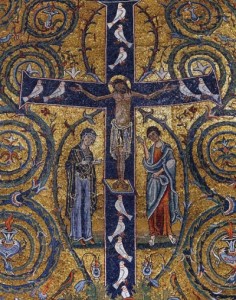Thoughts on Sunday’s Lessons for Sept. 17, 2023

The Children of Israel Crossing the Red Sea (c.1855), oil on canvas by Frédéric Schopin (1804-1880). Bristol City Museum and Art Gallery. (Click image to enlarge.)
Themes of hope and forgiveness resonate through Sunday’s Lectionary readings. In the first reading, God sends a powerful east wind that divides the sea, allowing the Israelites to cross on dry ground. When they reach safety, the water rushes back at Moses’ command, and Pharaoh’s entire army is drowned. The people are amazed, and fear the Lord. But now begins a pattern of alternating joy and anger that will repeat itself often during the people’s journey through the wilderness: When Pharaoh’s army had them trapped at the water’s edge just before this miracle, they had been angry at Moses and at God, and demanded to be taken back to the relative safety of slavery in Egypt.
First Reading (Track Two): Genesis 50:15-21
In a reading last month, we read about Joseph’s brothers arriving in Egypt, fleeing famine but terrified that Joseph, who had risen to a position of great power as Pharaoh’s chief advisor, might seek revenge against them for the way they had threatened to kill him, then sold him into slavery. Now more years have passed. Their father Jacob (later called Israel) has died, so they are worried. Without their father’s protection, will Joseph finally turn on them? They weep and beg Joseph’s forgiveness for their crime. But Joseph, weeping as well, reassures them: God has chosen their family to be a great nation.
Psalm (Track One): Psalm 114
One of the many Psalms of praise – its ringing “Hallelujah,” literally, means “Praise the Lord” in biblical Hebrew – Psalm 114 is well chosen to read after today’s first reading: It reflects on events of the Exodus and sings out praise for God’s acting to bring the people out of slavery to the promised land. When God commands, the seas flee. Rivers turn back. Even mountains and hills skip like mighty rams and little sheep. The entire earth trembles when God appears.
Alternate to the Psalm (Track One): Exodus 15:1b-11,20-21
This ancient song of victory follows immediately after the narrative of the parting of the waters in Exodus. Imagined as a hymn of triumph sung by Moses and all the people, it praises and exalts God as a powerful military leader whose glorious strength shattered the enemy, drowning their threats of vengeance and destruction as quickly as lead sinks in water. Then, in the closing verses, the prophet Miriam leads the women in a triumphant dance of exultation with drums and tambourines.
Psalm (Track Two): Psalm 103:1-13
Just as Joseph forgave his brothers, God forgives us, heals us and redeems us. God pours out so much goodness on us, the Psalmist sings, that our youth is restored, our infirmities wiped away, and our lives brought back from the edge of the grave. Even when our sins arouse God’s anger, we are forgiven; we don’t suffer the punishment that our wickedness deserves. Instead, God showers us with mercy, loving us like a mother loves her children even when they misbehave.
Second Reading: Romans 14:1-12
Last week we heard Paul tell the Christians of Rome that the commandment to love our neighbors as ourselves, as Jesus had taught, is the greatest commandment, including all the other commandments within it. Now, in the last reading from Romans that we will hear this season, Paul teaches that loving our neighbors obliges us not to judge our neighbors. Don’t be critical of our neighbors because they do things differently than we do. Even if our neighbor makes us angry, he says, we are to forgive, standing together in giving glory to God, leaving judgement to God.
Gospel: Matthew 18:21-35
Peter, perhaps thinking about Jesus’ instructions in last week’s Gospel about working out disagreements in the church, wants to know exactly how many times he must continue forgiving a person who sins against him repeatedly. Is seven times enough? No, Jesus responds, not just seven times but 77 times, and it’s reasonable to assume that he really means to continue forgiving always. Then Jesus tells of a slave who, forgiven a crushing debt, cruelly fails to forgive another slave’s smaller debt. The slave is punished, and we are left to remember how Jesus taught us to pray: Forgive us our sins, as we forgive those who sin against us.”



